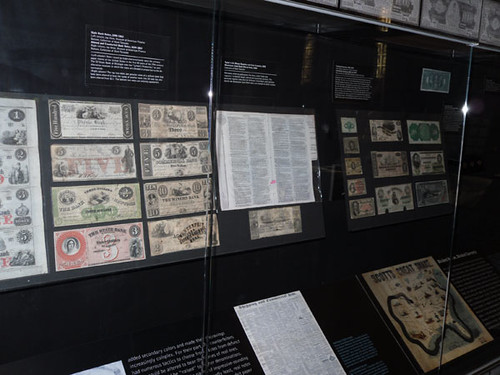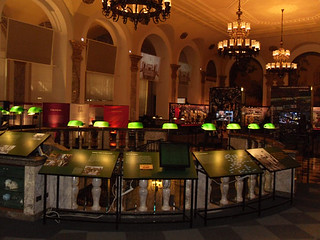
PREV ARTICLE
NEXT ARTICLE
FULL ISSUE
PREV FULL ISSUE
THE MUSEUM OF AMERICAN FINANCEI haven't been to New York in ages, and have never had the pleasure of
visiting the Museum of American Finance. On September 22, 2014 Michael Alexander published a great
illustrated article about the Museum on Coin Update. Here's a short excerpt, but be sure
to see the complete version online. -Editor
The MoAF is housed in the old Bank of New York building which is in itself, a splendid architectural treasure with its sumptuous & stately interior. A series of murals chronicling the emergence of New York as a financial powerhouse were commissioned when the Building first opened and were carefully restored. I had an opportunity to speak with Becky Laughner, Director of Exhibits & Archives who kindly guided me through the many points of interest and explained the very impressive presence of Alexander Hamilton, the first American Secretary of the Treasury who was also the founder of the Bank of New York in 1784. As New York is a popular destination for many world travelers, I highly recommend a visit to the MoAF, especially if your interests follow the world of finance, in a city of hustle & bustle, it’s an oasis of peace and tranquility and… you might just learn something you didn’t know before about just what makes the world go round! Michael Alexander: The Museum of American Finance has a very interesting beginning and was founded during one of the most tumultuous times in the financial world, can you tell our readers how and when the MoAF was founded and most of all why..? Becky Laughner: The Museum of American Finance was founded by John Herzog in response to the Crash of 1987. A collector of historical financial documents working in the financial services industry, Herzog experienced the crisis firsthand. He founded the Museum to provide historical context for the financial markets, which he realized the country lacked. Today the Museum welcomes more than 47,000 visitors annually and partners with many non-profit financial literacy organizations, as well as other finance museums around the world through the International Federation of Financial Museums (IFFM), which the Museum co-founded in 2013. MA: The previous location was quite close to the World Trade Center – how was the MoAF affected in the aftermath of 9/11 and were the events on that day a facilitator for the MoAF to relocate..? BL: Located at 26 Broadway, MoAF was the closest museum to Ground Zero and, as such, was forced to close for several months after 9/11. Macy’s department store generously offered exhibition space in their Herald Square display windows during the holiday season, so the Museum was able to maintain a physical presence in New York City while Lower Manhattan was inaccessible. Prior to the attacks, the Museum’s board had begun looking for a larger space, but it became a more pressing need after 9/11, especially as the New York Stock Exchange closed its Visitor Center and Wall Street tourists had nowhere to go to learn about the financial markets.  MA: I found the display of early American banknotes especially interesting as there are some very rare items included, especially the banknotes issued by private banks before the formation of the Federal Reserve, but which items in particular are perhaps unique to the MoAF or of special interest in this collection..? BL: The Museum’s “Money: A History” gallery covers the history of American currency from Native American wampum to the most recent designs of the seven denominations of Federal Reserve Notes in circulation today. Some of the more rare and interesting notes include a beautifully engraved silver certificate of the 1896 series (also known as the Education Series), depicting allegorical figures of “History Instructing Youth.” Also on display are North African and Hawaii Emergency currency issued during World War II to circulate in those territories so that they could easily be identified and voided if they fell into enemy hands. The Hawaii note has the word “HAWAII” overprinted on both sides. The North Africa note is a silver certificate with a unique yellow Treasury seal. Although only a handful are on display in “Money: A History,” the Museum has a significant collection of early American colonial and continental currency. One of my favorite items in the currency collection is a Lansingburgh Museum penny, a one cent note issued in 1792 by a small library and museum in the town Lansingburgh in Rensselaer County, New York. I find the idea of museums issuing paper money very charming. The Museum of American Finance is open from Tuesday thru Saturday, 10 am to 4 pm with free admissions for all visitors on Saturdays through 2014. For more information on planning your visit, please visit their website at: http://www.moaf.org/index To read the complete article, see:
THE BOOK BAZARREWayne Homren, Editor The Numismatic Bibliomania Society is a non-profit organization promoting numismatic literature. See our web site at coinbooks.org. To submit items for publication in The E-Sylum, write to the Editor at this address: whomren@gmail.com To subscribe go to: https://my.binhost.com/lists/listinfo/esylum All Rights Reserved. NBS Home Page Contact the NBS webmaster 
|
